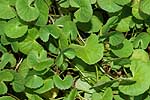Gotu Kola Herb

On the other side of the world, in the land of exotic spices, silks, and monsoons, vast herds of elephants once roamed freely through an unspoiled, tropical landscape. According to Far Eastern legend, these massive beasts owed their long life span and remarkable memory to the gotu kola herb, their prime food source.
Today, in the United States, many people have begun to ingest gotu kola with the hope of boosting their memory power, strengthening their body, and extending their longevity.
According to The Prevention How-To Dictionary of Healing Remedies and Techniques, however, there really isn’t any research to substantiate gotu kola’s reputed anti-aging or energizing effect. Perhaps the herb’s notoriety as an energizer stems from confusion over its name, says Sheldon Saul Hendler, author of The Doctors’ Vitamin and Mineral Encyclopedia. Gotu kola is often mixed up with kola nut, a completely different herb that contains caffeine, a well-known stimulant.
Results of a controlled animal trial indicate that the herb is effective in enhancing learning. The animals given gotu kola for two weeks were able to learn and recall new behaviors with greater ease than were those not given the herb. And in an intriguing clinical study related to learning, 30 children with developmental disabilities who received gotu kola for 12 weeks experienced significant improvements in their attention spans and concentration skills.
Around the world, gotu kola has also been touted for its skin-healing powers. Applied to the skin, gotu kola can make wrinkles fade away, contends Vasant Lad, an Ayurvedic doctor of herbal remedies.
Some rigorous studies have found that gotu kola improves some of the symptoms associated with varicose veins such as swelling or heaviness, says Karen Rafinski in an article entitled “This promising herbal says it aids varicose veins.” But there is little evidence that it improves the appearance of the veins, she says. “There is also no evidence that the supplement can prevent varicose veins. As for improving wound healing and reducing scarring, a few weak studies suggest it might be beneficial but far more research in humans is needed.”
|